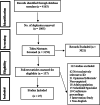Unscheduled healthcare for children with intellectual disabilities: A systematic scoping review
- PMID: 35322908
- PMCID: PMC9314007
- DOI: 10.1111/jar.12994
Unscheduled healthcare for children with intellectual disabilities: A systematic scoping review
Abstract
Background: The provision of unscheduled healthcare for children with intellectual disability is less researched than that focused on hospital settings or for adult services. The aim of the scoping review was to map the evidence base in this area and identify areas for future study.
Method: A five-stage scoping review framework was adopted. CINAHL, PubMed, SCOPUS, PsycINFO, Embase, ProQuest Dissertation & Theses and Google Scholar were searched. Studies published in English after 1/1/2000 were considered eligible for inclusion.
Results: A total of 3158 titles and abstracts were screened, 137 full-text articles were reviewed, and 25 papers met the inclusion criteria. Descriptive themes focused on inequities, needs and experiences of families', poor GP training, and limitations of existing evidence.
Conclusion: Describing trends in healthcare utilisation by this population is valuable for monitoring quality of healthcare, however, addressing observed inequities will require approaches that recognise specific issues within the health system that result in inequities.
Keywords: child; health; intellectual disability; scoping review; unscheduled healthcare.
© 2022 The Authors. Journal of Applied Research in Intellectual Disabilities published by John Wiley & Sons Ltd.
Conflict of interest statement
The authors declare no conflict of interest.
Figures
Similar articles
-
Beyond the black stump: rapid reviews of health research issues affecting regional, rural and remote Australia.Med J Aust. 2020 Dec;213 Suppl 11:S3-S32.e1. doi: 10.5694/mja2.50881. Med J Aust. 2020. PMID: 33314144
-
Factors that influence family and parental preferences and decision making for unscheduled paediatric healthcare - systematic review.BMC Health Serv Res. 2020 Jul 17;20(1):663. doi: 10.1186/s12913-020-05527-5. BMC Health Serv Res. 2020. PMID: 32680518 Free PMC article.
-
Exploring the Intersection of Gender Diversity and Intellectual Disability: A Scoping Review With a Focus on Clinical Care.J Appl Res Intellect Disabil. 2025 Jan;38(1):e70010. doi: 10.1111/jar.70010. J Appl Res Intellect Disabil. 2025. PMID: 39844579
-
Experiences of adults with intellectual disabilities who identify as lesbian, gay, bisexual, or transgender within mainstream community: a systematic review of qualitative studies.JBI Evid Synth. 2021 Jan;19(1):59-154. doi: 10.11124/JBIES-20-00032. JBI Evid Synth. 2021. PMID: 33074982
-
Experiences of adults with intellectual disabilities accessing acute hospital services: A systematic review of the international evidence.Health Soc Care Community. 2021 Sep;29(5):1222-1232. doi: 10.1111/hsc.13253. Epub 2020 Dec 14. Health Soc Care Community. 2021. PMID: 33316110
Cited by
-
Causal relationship between health insurance and overall health status of children: Insights from Pakistan.Front Public Health. 2022 Dec 7;10:934007. doi: 10.3389/fpubh.2022.934007. eCollection 2022. Front Public Health. 2022. PMID: 36568764 Free PMC article.
-
Seeking Care for Children with Intellectual and/or Developmental Disabilities in the Emergency Department: A Mixed Methods Systematic Review of Parents' Experiences and Information Needs.Open Access Emerg Med. 2024 Jun 19;16:117-131. doi: 10.2147/OAEM.S450191. eCollection 2024. Open Access Emerg Med. 2024. PMID: 38912093 Free PMC article. Review.
-
What I Wish I Had Known: Examining Parent Accounts of Managing the Health of Their Child With Intellectual Disability.Health Expect. 2025 Feb;28(1):e70138. doi: 10.1111/hex.70138. Health Expect. 2025. PMID: 39783791 Free PMC article.
-
Caring by default: experiences of caregivers of children with developmental disabilities in Ghana mirrored in the context of the stress process model.BMC Nurs. 2024 Jul 15;23(1):482. doi: 10.1186/s12912-024-02142-1. BMC Nurs. 2024. PMID: 39010050 Free PMC article.
References
-
- Altman, L. , Zurynski, Y. , Breen, C. , Hoffmann, T. , & Woolfenden, S. (2018). A qualitative study of health care providers' perceptions and experiences of working together to care for children with medical complexity (CMC). BMC Health Services Research, 18(1), 70. 10.1186/s12913-018-2857-8 - DOI - PMC - PubMed
-
- Arksey, H. , & O'Malley, L. (2005). Scoping studies: Towards a methodological framework. International Journal of Social Research Methodology, 8(1), 19–32. 10.1080/1364557032000119616 - DOI
-
- Balogh, R. , Brownell, M. , Ouellette‐Kuntz, H. , & Colantonio, A. (2010). Hospitalisation rates for ambulatory care sensitive conditions for persons with and without an intellectual disability‐a population perspective. Journal of Intellectual Disability Research, 54(9), 820–832. 10.1111/j.1365-2788.2010.01311.x - DOI - PubMed
-
- Balogh, R. , McMorris, C. A. , Lunsky, Y. , Ouellette‐Kuntz, H. , Bourne, L. , Colantonio, A. , & Gonçalves‐Bradley, D. C. (2016). Organising healthcare services for persons with an intellectual disability. Cochrane Database of Systematic Reviews, 4, CD007492. 10.1002/14651858.CD007492.pub2 - DOI - PMC - PubMed
Publication types
MeSH terms
Grants and funding
LinkOut - more resources
Full Text Sources
Miscellaneous


